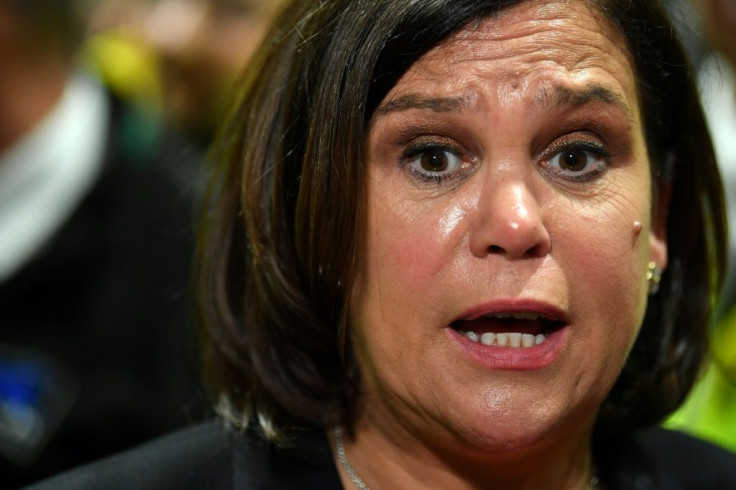Ireland Election: Leftist Sinn Fein Party Shocks By Gaining Most Votes

KEY POINTS
- Sinn Fein was once linked to the Irish Republican Army
- Fianna Fail and Fine Gael previously ruled out cooperating with Sinn Fein
- Sinn Fein did very well with disaffected youth
In a dramatic and unexpected development, Sinn Fein, a party long associated with the Irish Republican Army, won the most votes in Ireland’s general election.
Sinn Fein gained 24.5% of the vote count, followed by 22.2% for Fianna Fail and 20.9% for the incumbent Fine Gael party.
However, as no one party can win enough seats to secure an outright majority in parliament, Sinn Fein will face the arduous task of trying to form a coalition government with the other major parties. Sinn Fein ran only 42 candidates in the election – the Irish parliament holds 160 seats.
Prior to the election both Fine Gael and Fianna Fail vowed to never form a government with Sinn Fein. On Sunday evening Irish Prime Minister and Fine Gael leader Leo Varadkar said it will be "challenging" to form a new government.
"We don't believe a coalition between Sinn Fein and Fine Gael is a viable option," he said. "[A] forced marriage would not result in a good government."
Fianna Fail leader Micheal Martin said he might consider working with Sinn Fein, but warned that "significant incompatibilities" existed between the parties.
Nonetheless, Sinn Fein president Mary Lou McDonald called the vote tally "something of a revolution in the ballot box.”
Sinn Fein won 23 seats in parliament in the 2016 election and now is poised to gain dramatically more. Sinn Fein reportedly did very well among young voters, gaining 31.8% of the 18-24 age group.
"The frustration people have felt for a long time with the two-party system, whereby Fine Gael and Fianna Fail handed the baton of power between each other -- that's now over," McDonald said. "We now have a very substantial mandate."
“This is no longer a two-party system,” she added.
Indeed, Fine Gael and Fianna Fail had alternately ruled the country for the past 100 years.
On Monday, McDonald told Irish television station RTE: "this vote for Sinn Fein is for Sinn Fein to be in government… for Sinn Fein to deliver. My first job of work, and I commenced this yesterday, is to establish with other parties whether or not there are the numbers to deliver a government without Fianna Fail or Fine Gael." McDonald likely referred to the numerous smaller parties, like the Green Party, that gained modest portions of the vote.
Analysts attributed Sinn Fein’s surprising showing to public anger over a housing shortage, rising rents, hospital waiting lists and homelessness. Brexit, an issue Varadkar focused heavily on, hardly registered as a concern among the Irish public.
Democratic Unionist Party leader Arlene Foster, whose party is engaged in a power-sharing government with Sinn Fein in Northern Ireland, said young voters saw Sinn Fein as a "protest vote.”
"From a Northern Ireland perspective we will have to work with whoever the government is in the Republic of Ireland," she said.
If Sinn Fein is unable to secure agreements to form another coalition government, a new general election would be called.
Sinn Fein has been trying to move away from its past connections to the IRA and rebrand itself as an advocate for the working class. McDonald has no links to the IRA whatsoever.
Rory Carroll wrote in Britain’s Guardian that “once a revolutionary party associated with guns and balaclavas, a toxic brand, [Sinn Fein] slowly edged from the fringe into the mainstream, inch by inch, and then on Saturday made a giant leap.”
Gerry Adams, the former Sinn Fein leader, praised McDonald’s leadership and admitted he did not expect the party to do so well. He also said Sinn Fein will use the mandate to seek its long cherished goal of reuniting the Republic of Ireland with Northern Ireland.
Cliff Taylor speculated in the Irish Times how a multiple coalition government might conduct economic policy.
“We will… almost certainly see a move to ramp up public sector house building and greater state involvement in other key areas like childcare,” he wrote. “Whoever is in power will respond to the public mood, particularly the dissatisfaction of younger voters. And if Sinn Fein were to enter government – requiring one of the big parties to reverse its policy of not doing a deal with it – more dramatic change in spending, tax and policy towards multinationals is possible.”
Investors in Irish government bonds will also be concerned, he added.
“Ireland has benefited from low borrowing costs as the budget has moved into surplus in recent years,” Taylor wrote. “All three main parties are committed to remaining in surplus, though Sinn Fein does favor higher spending and somewhat lower surpluses, meaning a move by it into government would be closely watched by investors.”
© Copyright IBTimes 2024. All rights reserved.





















